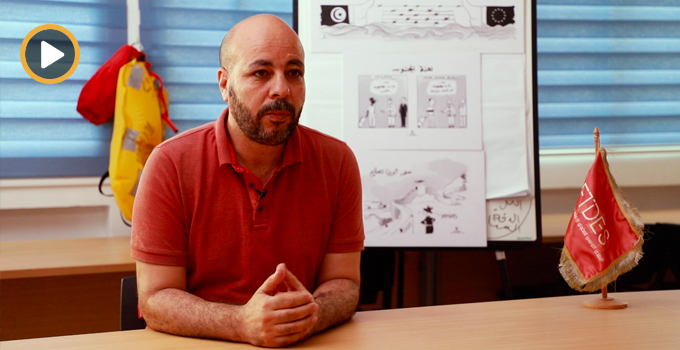
On a weekday morning just about halfway through the month of Ramadan, the poster-plastered doors of L’Etoile du Nord are closed. But the café is indeed open for business, and like a number of food and drink establishments in capital, is a haven for non-fasters. These days, L’Etoile’s regulars, largely university students and artists, are joined by a broader-than-usual gamut of customers. Among them, a couple of wizen-faced, grey-haired men sip their coffees in silence next to students hovering over pages of notes or staring into laptop screens as they put finishing touches on their end-of-year projects, or ample groups of friends sharing small tables and continually tapping the ashes off their cigarettes. In spite of the spacious room and its high ceilings, the café is a great deal smokier than usual. This world exists in isolation from the one outside, where the streets and pedestrians are baking in the heat of car exhaust and midday sun and public transport is over-capacity. The air inside metro cars is thick, and people seem hold their breath until arriving at their stop, muttering « God have mercy » every time the metro halts suddenly or stalls for oncoming traffic.

That is outside. Inside the café, from morning on the circulation of bodies coming and going is steady. At any given moment there is hardly an unoccupied seat. Even the floor space is crowded with backpacks and a somnolent grey cat sprawled out between tables. Despite the crowd, the café feels indulgently lazy like the electric swing playing in the background. Stimulating as the pleasure of coffee, cigarettes and even cold water may be, people appear subdued, either by the heat or perhaps the singular rhythm of Ramadan. Early to work, late to bed. Road traffic. Foot traffic. Lines out the door for bread and staple items. The quietist part of the day occurs with the 7:39pm call to prayer. The streets become empty and silent except for the voice of the muezzin followed by the clinking of silverware on plates. Around 9:30 or 10pm, after chorba and brik and the evening’s episodes of Ramadan’s TV specials, people head out again and the city comes to life.

While the former Interior Minister Lotfi Brahem and his spokesman Khalifa Chibani referred to an ambiguous circulaire dating from 1981, there is no legislation in Tunisia requiring citizens to fast or obliging food and drink establishments to close during Ramadan. But this fact has not prevented authorities from imposing consequences on non-fasters and those who serve them. Case in point, last year in Bizerte, five individuals were arrested for eating or smoking in public and sentenced to a month in prison for « undermining public decency ». This was not a first, and cafés and restaurants that remain open during the holy month are ever susceptible to controls by public authorities. Over the past several years, non-fasters and fasters alike associated with different rights organizations have denounced such repercussions as a violation of individual liberties and the State’s obligation to protect them. In this vein, over two dozen associations assembled in the Collective for the Defense of Personal Liberties have launched campaign appealing to both government officials and public opinion. On Thursday, June 6, member organizations of the Collective held a press conference at National Union of Tunisian Journalists (SNJT) headquarters in Tunis, reiterating their demands vis-à-vis public authorities. Tunisian Association of Women Democrats (ATFD) president Yosra Frawes, Beity president Sana Ben Achour, Tunisian Human Rights League (LTDH) president Jamel Msallem and Worldwide Movement for Human Rights (FIDH) president for the Tunisia office Mokhtar Trifi addressed journalists, elaborating on the main points of an open letter from May 15 in which the Collective calls upon authorities to « oppose any attempt to compromise personal rights and freedoms during the month of Ramadan ». Euromed Rights, Lawyers without Borders, and the World Organization Against Torture (OMCT) were also among the thirty-plus organizations that signed the letter, calling out a rise in hate speech against confessional diversity as well as freedom of consciousness, religion, opinion and expression.

Signees have reprimanded the « Interior Minister Lotfi Brahem’s complete denial of violations committed during the past few years in order to justify the application of Circulaire 1981 ». Also known as the « Mzali Circulaire », the measure allegedly mandates the closure of cafés and restaurants during Ramadan. Interrogated last year by a parliamentary deputy on the topic, Brahem justified the decree with concerns about potential terrorist attacks. Lawyers, legal experts and rights organizations, on the other hand, are calling the circulaire unconstitutional, claiming that it violates numerous provisions in the 2014 Constitution, particularly Article 6, « The State guarantees individual liberties ». What’s more, as jurist and coordinator for the MouchBessif campaign Rahma Essid previously explained to Nawaat, President Bourguiba suspended the circulaire within 48 hours of its appearance. Similarly, public law professor and president of the Tunisian Association for the Defense of Individual Liberties Wahid Ferchichi recently expressed to Nawaat doubts concerning the very existence of the measure, since to this day authorities have failed to present its precise date and number. Ferchichi and other members of the Collective for the Defense of Personal Liberties have thus called for suspension of the circulaire and for legislative reforms. More specifically, they have called upon the President to « ensure respect of the constitution », for Prime Minister Chahed to « abrogate circulaires that are in flagrant violation of the constitution », for the parliament to « revise repressive laws including the penal code » and for the Justice to « guarantee the constitution’s supremacy, the law’s sovereignty and the protection of rights and liberties ».
The Collective has used social media to publish statements addressing public authorities, flyers as well as humorous clips promoting Tunisians’ right to exercise their personal freedoms, particularly the freedom to not fast. Another Facebook page, Fater (« non-faster »), was launched in 2013 as a platform where people can list or look-up restaurants and cafés that serve during the daytime throughout Ramadan. In the meantime, protests have also been held in the streets, organized by the MouchBessif movement. On May 17 and 27, groups of protesters gathered on Avenue Bourguiba with signs, drinking water and smoking in demonstration against the closure of cafés and the harassment and criminalization of non-fasters.





1. following is a quote from Qur’an:
“O you who have believed, decreed upon you is fasting as it was decreed upon those before you that you may become righteous” — Surat Al-Baqarah 2:183
“those before you”, are Christians and Jews.
as for Jews, fasting is not an obligation. it’s about some non consecutive days along the year.
as for Christians, it’s not fasting per se. it’s called “Lent” to remember Jesus 40 days suffering in the desert. it’s not an obligation.
so it’s unlike not like “the others before you”, because unlike “the others”, fasting is mandatory in islam.
2. …”five individuals were arrested for eating or smoking in public and sentenced to a month in prison”
one month in prison then another punismhment at the Last Judgment !!!
in law, there is a principle called “non bis in idem”, ie. no double punishment.
let it be known.